25 Tools & Resources for Conducting Market Research

Conducting market research pulls details together to help you choose new products or services to launch. They also help identify your audiences and best marketing strategies so you are ready to act without the guesswork.
Businesses use market research software to minimize risk and make more data-driven choices.
I own a small business, and by gathering facts and opinions, I can better predict whether new products or features — and for more prominent companies, even locations — will succeed before investing.
Here are 25 of the best tools for conducting market research, including a few recommendations directly from HubSpot market researchers and bloggers who use them.
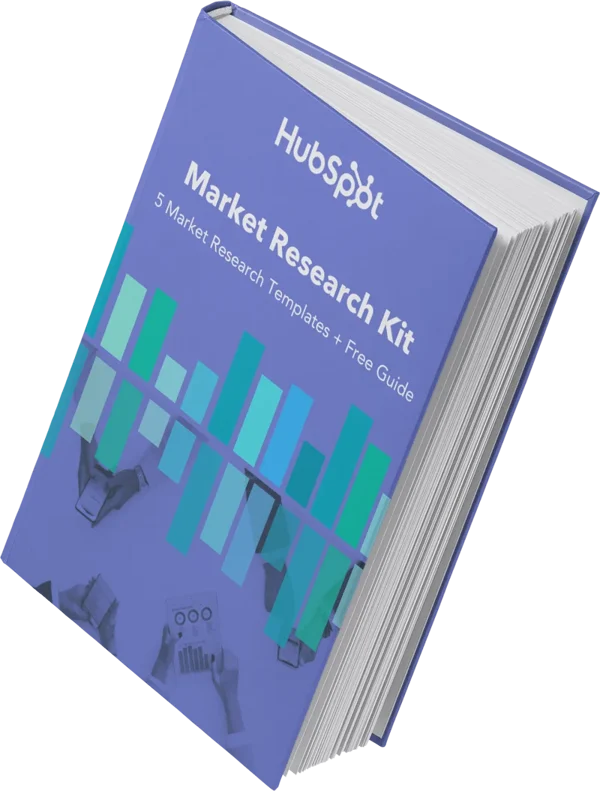
Helpful Market Research Tools & Resources
1. Similarweb
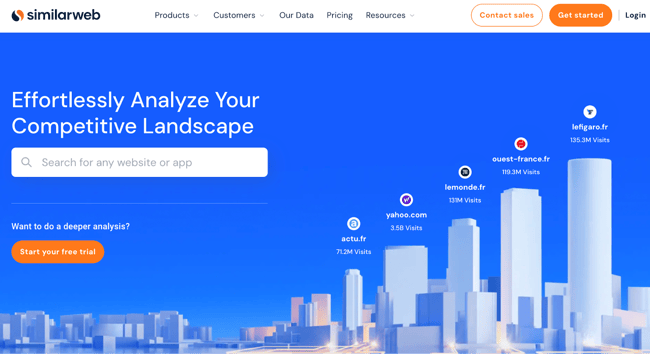
Similarweb is probably the highest quality, most well-known, and most convenient way to get and compare traffic information about any website you land on — short of having an expert analyst whispering in your ear, which could get awkward.
Their free suite of products — including the Chrome extension — is worth exploring and gives you useful, high-level information. The deep insights come from taking advantage of their database of real-world information on global website performance gathered over time, which they’ve already been building for over 10 years. They have their finger on the pulse of online business worldwide, from sales to sites to stocks.
Microsoft, Amazon, and even Google use Similarweb and the insights they provide on other enterprise-level operations down to small businesses. If you want to know how your company stacks up and then initiate a robust research and marketing campaign, these are serious tools that can help you grow.
What I like: One of their add-ons is called App Intelligence, and it can benchmark your growth and track your progress against millions of apps — for both iOS and Android — and provide daily insights on app rankings, engagement, retention, and more.
Pricing: Starter plans cost $125 per month paid annually; professional plans cost $333 per month billed annually; team and enterprise plans have custom pricing.
2. Glimpse
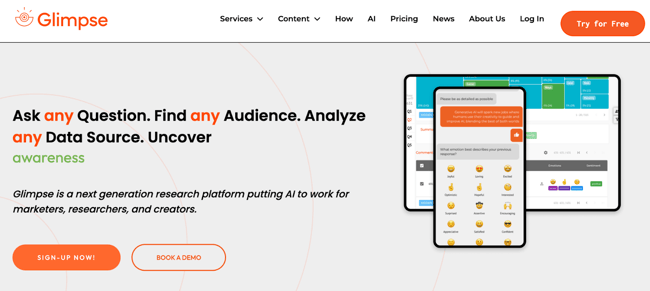
For Max Iskiev, market research analyst at HubSpot, one research tool stands out from the rest: Glimpse.
He told me, “Glimpse is my favorite research tool. It’s quick and easy to use, allowing me to design and launch short surveys for real-time insights on trending topics.”
Writers for the HubSpot Marketing Blog have also used Glimpse to run short, 100-person surveys for articles (case in point: Are Sales Reps Rushing Back to the Office?).
Not only is Glimpse valuable for doing quick pulse-checks on the latest trends, but it also leverages the power of AI for even deeper insights.
“Glimpse really shines when it comes to open-ended questions, using natural language processing and AI to analyze emotion and sentiment, saving time, and offering invaluable insights,” Iskiev shared.
Best for: Those who can invest in AI tools for their businesses but don’t need a decade’s deep dive like users of Similarweb might.
Pricing: Starter Plan - Free; Professional - $500/month; Advanced - $1,000/month; Enterprise - custom pricing.
3. BuzzSumo
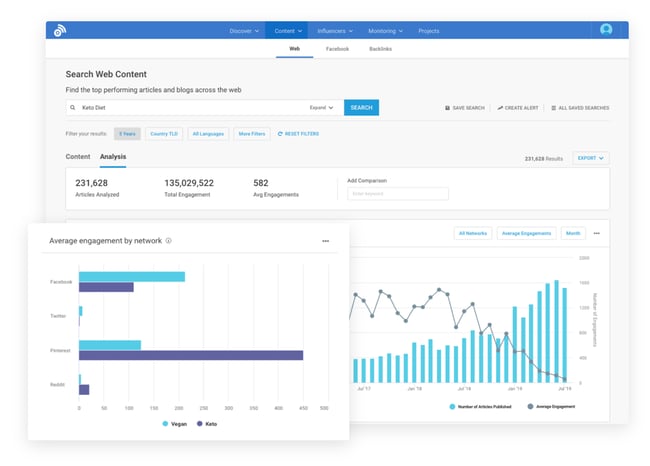
BuzzSumo offers several highly useful tools that work best as a content research tool for mid-size businesses and up. If you need many ideas for a whole lot of content, BuzzSumo is likely a good fit for your company.
Their monitoring tools can alert you to new content that relates to your keywords of choice.
This is smart for writers, content strategists, and those who manage writers and content strategists to stay on top of trends in what consumers want to know more about within your industry — so you’re right there to provide it.
BuzzSumo also gives you access to reporting tools that stream various sources of information to your dashboard, making it easy to keep up with developments and build visual assets to communicate about them.
You can find major influencers — worldwide — through BuzzSumo that fit your brand to sponsor and collaborate with.
Unfortunately, BuzzSumo doesn’t integrate well with Instagram, so you’ll want to focus on influencers that use other social channels unless you’re willing to do IG work on the side.
What I like: Their Chrome extension is a nice addition to their offerings for companies that work with freelancers and remote workers to take the work on the move.
Pricing: Free 30-day trials are available. Content creation plans cost $199 per month; PR and comms plans cost $299 per month; suite plans cost $499 per month; and Enterprise plans cost $999 per month.
4. Answer the Public
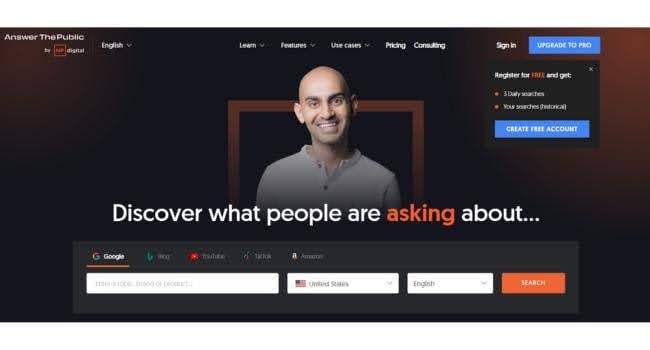
Answer the Public is a sister product to UberSuggest, both being brainchildren of Neil Patel.
Answer: the Public watches what people are searching for and lets you keep track of how things change over time. By studying the changes, you can be at the front of trends — positive or negative — so you can respond to the changes quickly.
It’s billed as an excellent tool for public relations professionals to give them a heads-up on how their company is faring in the public eye.
If you fall on the wrong side of public sentiment, you can be right on top of salvaging the situation and making improvements to regain trust.
If you’re doing something right and see gains in positive engagement, you know to keep up what you’re doing and may even want to expand upon it.
Great examples of what organizations have done with information like this include Wendy’s ongoing roasts and savage clapbacks on social media.
The Oklahoma Department of Wildlife Conservation’s hilarious insistence on not bringing mountain lions in the house also nabbed engagement by the truckloads (of corgis).
What I like: I like that Masterclass videos are available. They make sure to include lots of opportunities to learn how to best use their products and get maximum value from the suite.
Pricing: Individual plans cost $9 per month; pro plans cost $99 per month; expert plans cost $199 per month. Lifetime Pricing is available. Individual lifetime plans cost $99, pro lifetime plans cost $199; and expert lifetime plans cost $1,990.
5. GrowthBar SEO
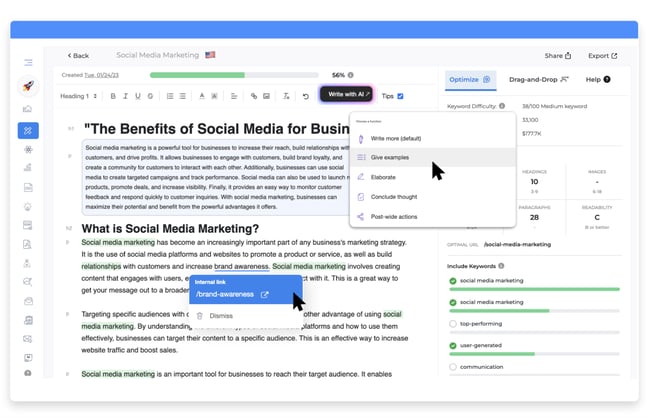
GrowthBar SEO is all-in for AI. If your leadership wants a slice of the AI action at work in the company’s market research, this might be the tool to reach for.
It uses ChatGPT-4, and the peer-to-peer review site G2 ranked it the #1 AI writing tool for SEO in 2022 and 2023.
What sets it apart is that the AI writing assistant doesn’t just compile and give word to information it finds online.
It offers selections of relevant keywords, titles, headings, industry standard word counts, and link suggestions that you can choose from as you move through the outline.
They also include tools for keyword research, keyword ranking, and information about your keyword competitors. And because Google search is incorporated into the suite, you can do most, if not all, of your writing work on one screen.
Pro tip: As with all AI content, you’ll need a writer to bring the content to life by fact-checking information, adding unique or inside perspectives, meaningful quotes, and many other values that make the content rich to read.
GrowthBar SEO knows this, and you can source freelance writers there as well!
Pricing: A seven-day free trial is available. Standard plans cost $36 per month; pro plans cost $74.25 per month; and agency plans cost $149.25 per month.
6. Statista
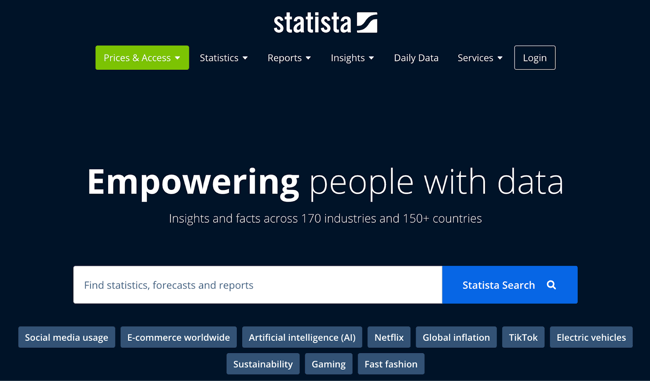
Statista is a data visualization website that takes data from reputable reports across the web and makes them easy and digestible for researchers, marketers, and product creators just like you.
“Statista is like my market research sidekick, giving me all the data I need without the endless search. No more digging through the haystack. With Statista, I can spot trends and make informed decisions with ease," Icee Griffin, market researcher at HubSpot, told me.
One neat aspect of using Statista is that the same chart is updated as the years pass. Say that you want to allude to the value of the beauty market in your proposal.
If your investor accesses that same graph a year from now, it will reflect updated numbers. Statista finds the most recent research to update their visualizations.
Pro tip: Statista doesn’t carry out original research, but does have around 100 analysts who seek out gaps in their resources to provide ever more useful, trending data.
Pricing: Basic plans are free. Starter plans cost $199 per month, billed annually. Professional plans cost $959 per month, billed annually.
7. Think With Google Research Tools
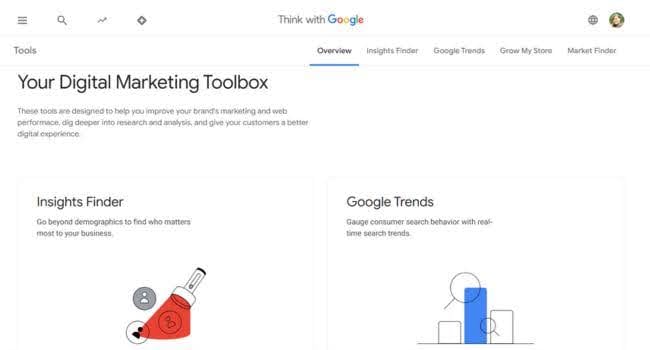
Wish you had information on your product’s likelihood of success?
Think With Google’s marketing research tools offer interesting insights on whether anyone is looking for your product (Google Trends), which markets to launch to (Market Finder), and what retail categories rise as the months and seasons pass (Rising Retail Categories).
If you’d like to market your product through YouTube, the Find My Audience tool allows you to investigate what your potential viewers are interested in and what you should discuss on your brand’s YouTube channel.
What I like: Free and incredibly useful in my experience, small and newer businesses really benefit from having tools like this to conduct market research and get their growth rolling.
Pricing: Free
8. Census Bureau
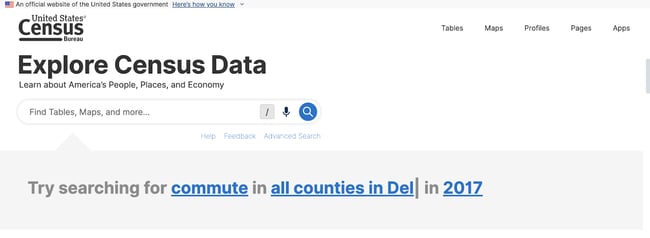
The Census Bureau offers a free resource for searching U.S. census data.
You can filter by age, income, year, and location. You can also use some of its shortcuts to access visualizations of the data, allowing you to see potential target markets across the country.
If you’re considering a highly competitive product or service, you can easily find out where your target industry is most popular — or where the market has been oversaturated.
Another helpful tool is the Census Bureau Business and Economy data, where you can also target premade tables depending on your industry.
Pro tip: The text information on each screen can be overwhelming, so here’s a shortcut for you. One of the best ways to use this tool is by finding the NAICS code for your business.
Then, access the "Tables“ tool, click ”Filter" on the sidebar, and search for your industry.
Pricing: Free
9. Make My Persona
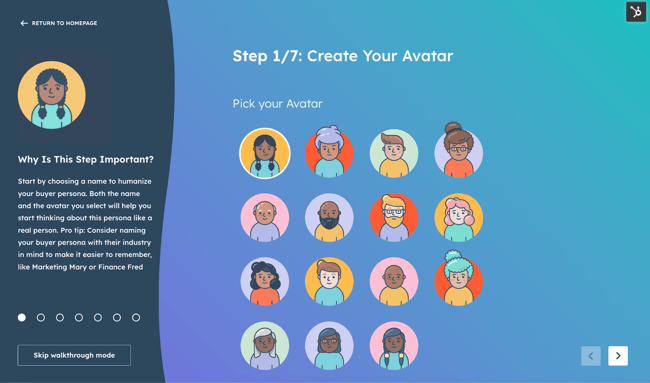
HubSpot’s Make My Persona tool allows you to create a buyer persona for your potential new product. In this tool, you pick a name for the persona, choose their age, identify their career characteristics, and identify their challenges.
This allows you to pinpoint both demographic and psychographic information.
Creating a buyer persona is an early step in the marketing process but an important one to avoid scope creep.
If you’re unsure about details like these and how to use market research tools for your business, let me recommend Hubspot’s Market Research Kit.
It’s completely free and helps you build a strong foundation for data-driven decision-making in your future marketing strategies.
Best for: Make My Persona is best suited to B2B product launches because you’ll be prompted to document your buyer persona’s career objectives and role-specific challenges.
Ideally, your product would solve a problem for them in the workplace or help their company achieve revenue goals.
Pricing: Free
10. Tableau
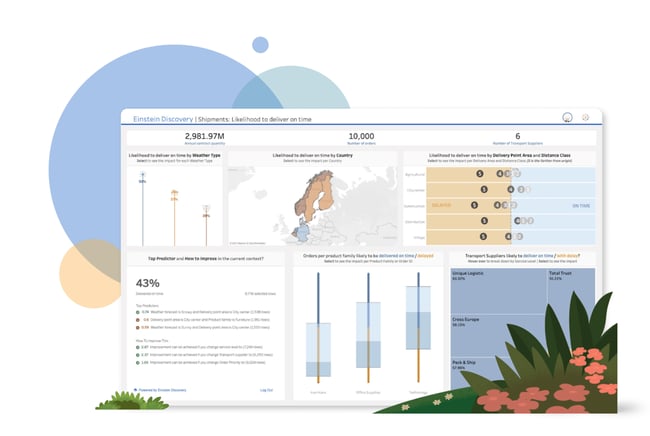
Tableau is a business intelligence suite of products that allows you to “connect to virtually any data source.” But the data isn’t presented in unreadable tables.
Rather, Tableau helps you visualize this data in a way that helps you glean insights, appeal to external stakeholders, and communicate the feasibility of your product to potential investors.
You can visualize data on anything from corn production in tropical climate zones to office product sales in North America. With Tableau’s tools, you can take as granular or as general a look you’d like into potential marketplaces and supplier regions.
What I like: Visual information for humans and pure data for the machines all in one. Tableau integrates well with spreadsheets and databases so that you can export Tableau data to Excel, back up records in Amazon Redshift, and more.
Pricing: Tableau Viewer plans cost $14 per user each month when billed annually. Tableau Explorer plans cost $42 per user each month when billed annually. Tableau Creator plans cost $75 per user each month when billed annually.
11. Paperform
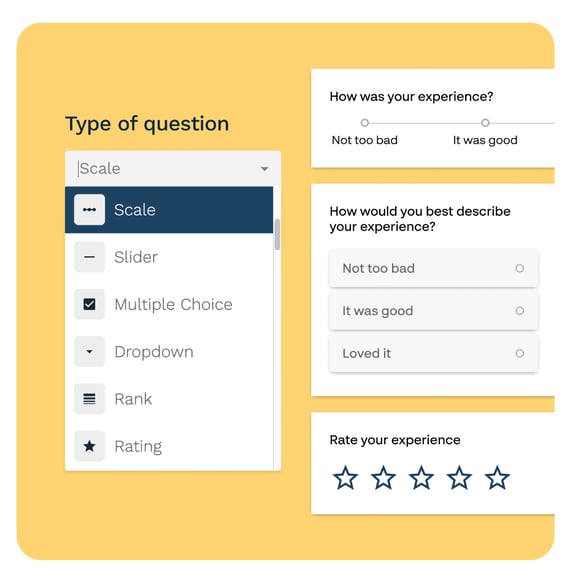
A market research survey is an effective way to better understand your target audience and their needs by asking them directly.
This step is integral to understanding your dream customers’ problems, so you want to ensure the process is as interactive as possible and gathers objective, accurate responses.
With its free-text interface, Paperform is as simple as writing a Word document. You can make your survey stand out by customizing colors, fonts, layouts, and themes to create your unique look and feel.
There are 27+ question field types, such as ranking, matrix, or scale fields. Use several to create visually engaging surveys that collect more information and see higher completion stats.
If you’re unsure where to start, you can use one of their expertly-made questionnaires or market research survey templates to get you started.
Best for: In my experience, Paperform is able to efficiently incorporate multiple customer personas. It uses conditional logic to show or hide questions or whole sections of content to create fully personalized paths.
These interactive forms lower drop-off rates and boost customer interaction.
Pricing: Essentials plans cost $29 per month. Pro plans cost $59 per month. Business plans cost $199 per month. For enterprise pricing, contact Paperform’s sales team.
12. GWI
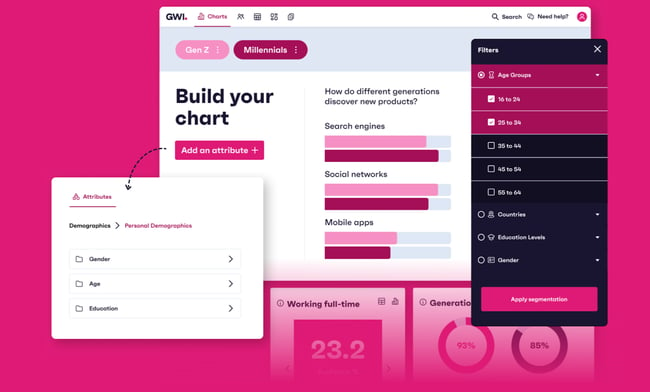
GWI is an on-demand consumer research platform that makes audience research a breeze. Powered by the world’s largest study on the online consumer base, GWI provides insights into the lives of over 2.8 billion consumers across 50+ markets.
With 250k+ profiling points, you can find your unique customers and learn everything you need to know about who they are, what’s on their minds, and what they’re up to.
One user-friendly platform makes it quick and easy to become an expert on your audience and capture the answers you need to succeed.
Pro tip: GWI even has features to compare markets and create customized and shareable charts in seconds, helping you distribute critical information as quickly as you find it.
Pricing: Explore Interactive Demo for free; Flexible and custom pricing with discounts available.
13. SurveyMonkey
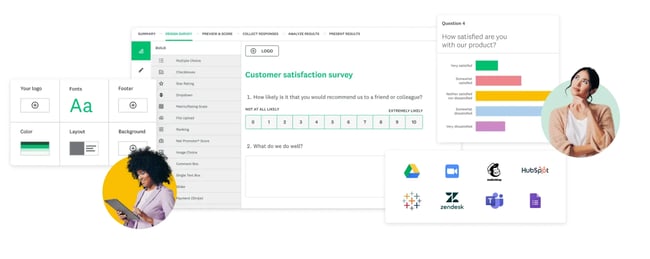
SurveyMonkey is a powerful tool for creating in-depth market research surveys that will help you understand your market and consumer preferences.
With this tool, you can create targeted, uber-specific surveys that help you collect answers that pertain specifically to your product.
While using a data source can give you a general overview of your target audience and market, SurveyMonkey can help you get more granular insights from real consumers.
SurveyMonkey offers dedicated market research solutions and services and a reporting dashboard option that allows you to easily parse through the results.
What I like: I like that SurveyMonkey is a good fit for exploring markets beyond your shores. It includes a global survey panel and survey translation service for international research.
- Individual plans: Advantage annual plans cost $39 per month. Premier annual plans cost $119 a month. Monthly plans cost $99 per month.
- Team plans: Team advantage plans cost $29 per person each month. Team premier plans cost $75 per person each month.
- Enterprise pricing is available upon request.
14. Typeform
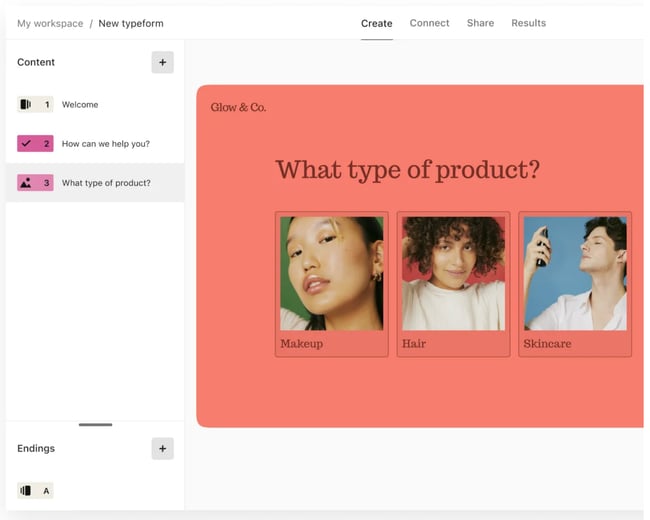
Like SurveyMonkey, Typeform allows you to run research surveys to get direct answers from your target consumers. It’s an easy-to-use, mobile-optimized form-builder that’s great for market research.
Typeform’s distinguishing factor is that it shows viewers one form field at a time. In its templates, Typeform encourages a more conversational, casual approach (like in its market research survey template).
You can create a wide range of question types, and other features include the ability to recall answers from previous questions and create logic jumps.
In a survey, you’d want to collect both demographic and psychographic information on your customers to understand their purchasing behaviors and the problems they encounter.
The goal is to find out if your product is the solution to one of those problems — and whether, before launching, you should add more features or rethink your product positioning strategy.
Best for: I think Typeform is best for product launches that target a younger demographic.
If you’re targeting C-suite executives at established firms, consider a more formal option, such as SurveyMonkey, or keeping your tone more formal in your questions.
Pricing: Free plans are available. Basic plans cost $29 per month. Plus plans cost $59 per month. Business plans cost $99 per month. Enterprise plans are available upon request.
15. PureSpectrum Insights (Previously Upwave Instant Insights)
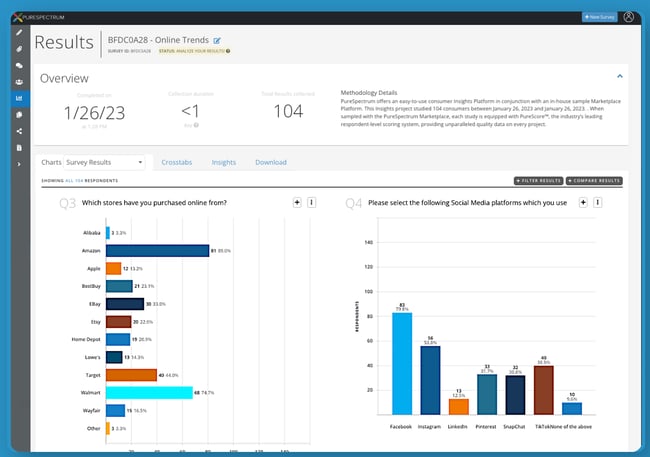
PureSpectrum acquired Upwave Instant Insights in 2021 and rebranded as PureSpectrum Insights.
As before, this platform is primarily a consumer research tool. While it isn’t advertised as a survey creation tool, it allows you to launch market research surveys specifically to get consumer insights.
PureSpectrum allows you to perform customer and market segmentation and also to visualize your data for easy scanning by key stakeholders and investors. They’ve grown to include A/B testing, brand tracking, and customer sentiment.
Pro tip: PureSpectrum distributes your survey to real people. Take a look at their marketplace profile to get a sense of where and from whom you can collect valuable data.
Pricing: Schedule a demo for more information.
16. Claritas MyBestSegment
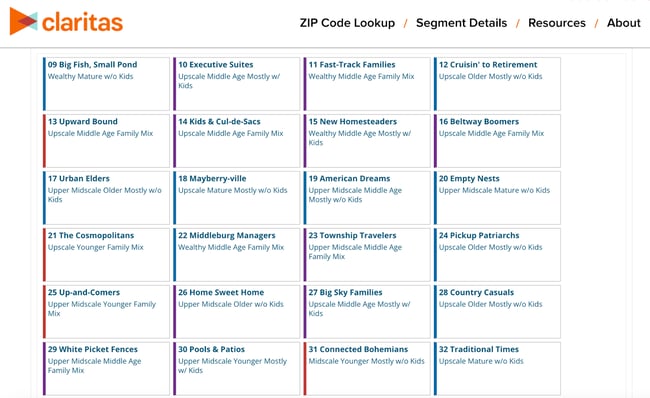
Claritas MyBestSegment provides product researchers with tools to understand a specific area’s demographic information as well as the lifestyle habits of those who live there.
Their audience segments give you information gleaned from tens of thousands of data points, giving you insight into much more than just household income, employment, and education levels.
By finding out what a segment of the population does — without having to go out and survey them — you can find out which areas would be most receptive to a campaign or launch.
You can also discover which competitors are located nearby and which lifestyle trends have shifted or are on the rise.
What I like: I like that they are able to do some of the leg work for you. Syndicated Audiences is a tool available from Claritas for finding an organized audience of consumers who are more likely to be interested in your products or services.
Pricing: Pricing is available upon request.
17. Loop11
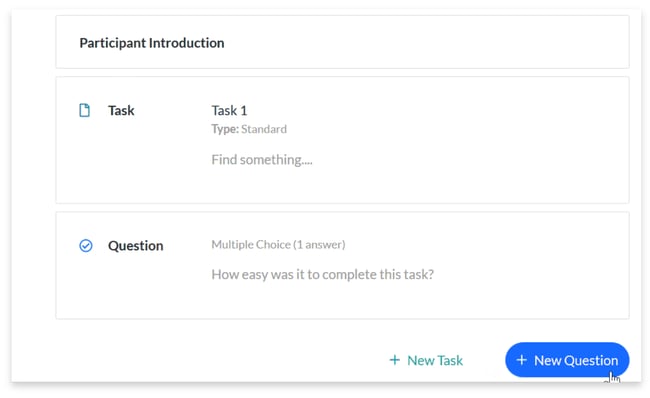
Loop11 is a user experience testing platform that allows you to test the usability of your website, study user intent, test the information architecture of your site, and examine how the user experience changes based on the device they’re using.
Loop11 tests your site on any device by making users perform tasks. They then complete a short question about how easy or difficult the task was to complete.
Your product may be phenomenal, but unless consumers can actually buy it through your site, your launch won’t be successful.
You can use Loop11’s participants for niche demographics or bring in your own to learn more about your current customers.
Best for: Market research for your site development. You can find out whether your target consumers find your site easy to navigate and also identify snags that prevent conversions.
Pricing: Rapid Insights plans cost $199 monthly or $179 per month, billed annually. Pro plans cost $399 per month or $358 per month, billed annually. Enterprise plans cost $599 per month or $533 per month, billed annually.
18. Userlytics
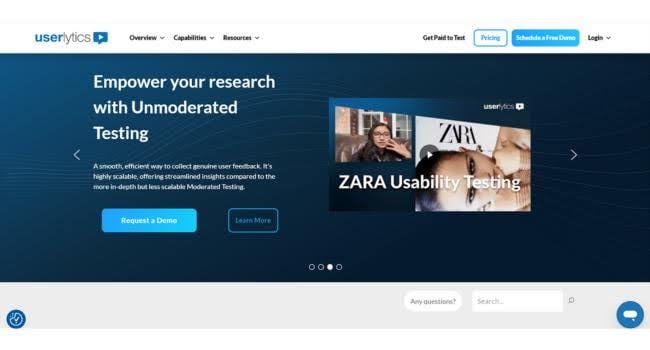
Like Loop11, Userlytics allows you to test the usability of your website, mobile app, and site prototype. You can target different devices, define a buyer persona, and disqualify participants based on screening questions.
Testing is based on tasks that your test-takers carry out. They then answer a simple question about the difficulty of the task. You can structure the question in various ways:
You can leave it open-ended, provide multiple choices, or ask for a rating. Other formats you can use include System Usability Scale (SUS) questions, Net Promoter Score (NPS) questions, and Single Ease Questions (SEQ).
What I like: Userlytics performs both a webcam and a screen recording. You can compare the user’s answers with their reactions on video to understand how they feel when they’re interacting with your assets.
Pricing: Schedule a free demo for more information.
19. Temper
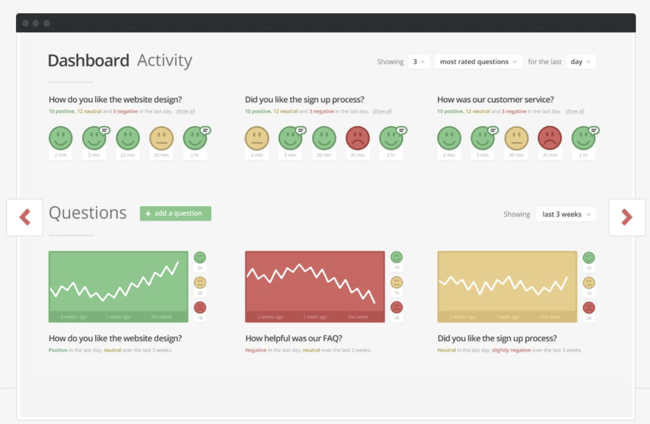
Sometimes, you need a no-frills test to take the pulse of consumers. Temper allows you to create a question and pop it onto your website, into your emails, etc.
The smiley face, “meh” face, and frowny face make it easy for viewers to share their feelings — and for you to read their minds.
You can also add it to a product page or a landing page, tailoring the questions to fit your offerings.
As for what you see, there are three options for receiving the feedback: in a tab on each page you are monitoring, embedded in the web page itself to narrow in on aspects within the page, or at the bottom of emails so you can get real-time information as the interaction unfolds.
Pro tip: One great way I’ve seen this used is by adding it to a blog post announcing the launch of a new product. You can find out general sentiment toward the product before it even launches!
Pricing: Hobby plans cost $12 per month. Pro plans cost $49 per month. Business plans cost $89 per month. White label plans cost $199 per month.
20. NielsenIQ (NIQ)
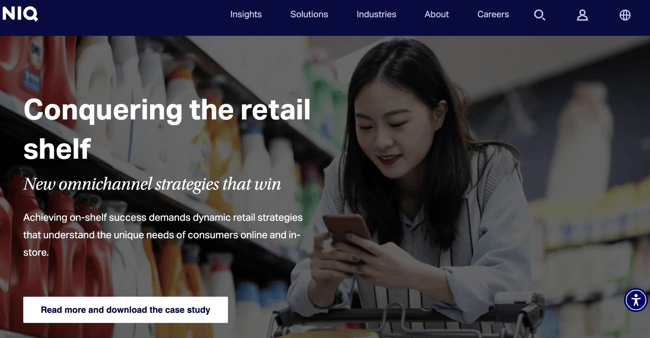
NielsenIQ (NIQ) is a retail and consumer intelligence consultant that works with you to collect consumer insights, identify the best distribution channels for your product, and create a range of products to address the needs of your target buyers.
This service helps you look at your product launch from all angles, delivering forecasting data that predicts how your sales will perform upon launch. NielsenIQ can also run consumer insights surveys on their list of panelists and partners.
NIQ now offers a service called Byzzer to help small businesses with fewer resources. It opens a door for market research reporting, in-person events, and consulting at a lower cost than the full NIQ suite.
Best for: I think Byzzer can be a helpful and affordable option for smaller businesses, but because NielsenIQ operates like a consultant and not as a self-service software, it is a better option for established firms with a bigger product launch budget.
Pricing: Pricing is available on request.
21. Ubersuggest
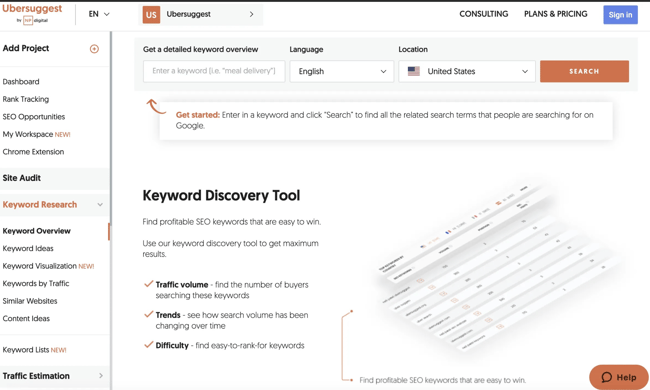
Don’t be intimidated by the visually text-heavy Ubersuggest. It really is an easy tool for doing keyword and content research. You just input a phrase, and it’ll create a list of keyword suggestions.
You can also see top-performing articles and pages to better understand the types of content that rank for those keywords.
This tool is useful for market research because you can see who your top competitors are, how often your product is searched for, and whether there’s enough space in the market for the type of product you’re launching.
You can also find out the questions your target audience asks in relation to the product. Each of these questions can be turned into an informative blog post that can guide your audience, increase your brand authority, and drive conversions.
Pro tip: If you want a quick look at the results you can get, head to their website and do a search — just know that you only get one glimpse before they make you register. Alternatives to Ubersuggest include Moz, Ahrefs, and SEMRush.
Pricing: Free seven-day trials are available for all three tiers. Individual plans cost $29 per month. Business plans cost $49 per month. Enterprise and agency plans cost $99 per month. Add-ons are available at $5 each. Lifetime memberships are also available.
22. Pew Research Center
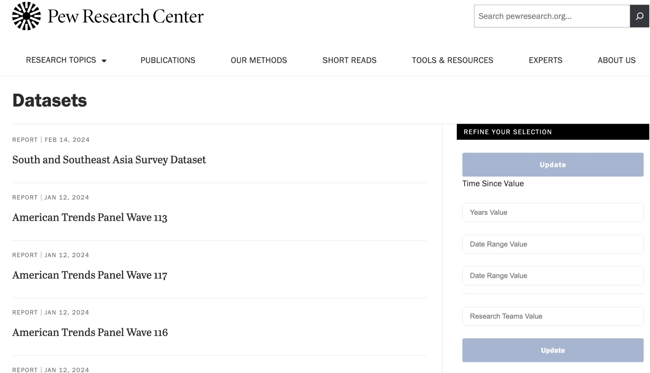
From economic conditions to political attitudes, social media usage to food science, the Pew Research Center website has loads of free research that you can use to better understand your target markets.
Be careful with your curiosity, though. It’s a gorgeous trap of interesting information that can drain your day away — but so happily.
I that Pew Research Center integrates visual data directly into the text — and we’re not talking about a chart or image spliced in.
The site has hundreds of interactive articles that allow you to filter and sift through the data for more granular, targeted insights while also making dense information easier to understand.
Their research topic selection is delightfully vast. Click the top left tab for “Research Topics.” Then, there is a link to their “Full Topic List.” Once there, each topic cluster has a “More” option.
What I like: As a writer in digital marketing, I am always on the hunt for targeted and nutritious quotes and insights. I love that you have access to what research participants actually had to say below the Pew Research articles.
It’s a stellar feature for building compelling presentations. The quotes are tagged, too, so you can sort quotes more specifically on various concepts or groups related to the research.
Here’s an example article — scroll to the In Their Own Words section at the bottom to check it out.
Pricing: Free
23. SocialMention (Part of BrandMentions)
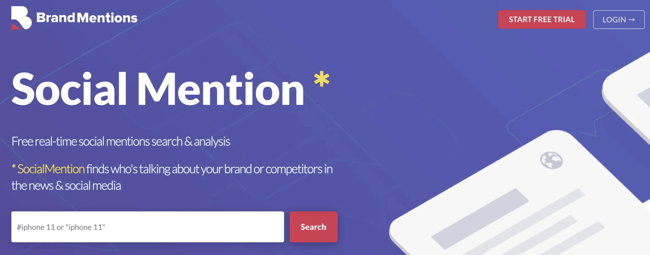
SocialMention is a part of BrandMentions focused on social media monitoring. The platform helps you understand what your prospective customers are buzzing about online.
Search for a keyword, and SocialMentions will show you recent social posts that contain that keyword, along with the context of its usage.
After subscribing to the platform, you’ll also get other metrics such as Reach (how many people view the keyword per day), Performance (how many people engage with the keyword per day), and Mentions by Weekday (when people mention the keyword).
One way to use this tool for market research is by finding out what time of day or night people are looking for your product on social media sites.
Let’s say you’ve developed a sleeping aid app and learn through SocialMention that most people look for sleeping aid apps at 2:00 AM. When you start announcing your product, you will need to schedule your post around 2:00 AM.
Pro tip: Another useful tool you’ll have access to is sentiment analysis on your keywords. It allows you to find out how people are generally feeling about the type of product you’re launching.
That way, you can refine the tone of your campaigns.
Pricing: Growing business plans cost $79 per month. Company plans cost $249 per month. Enterprise and agency plans cost $399 per month. All prices are billed annually.
24. Qualtrics Market Research Panels
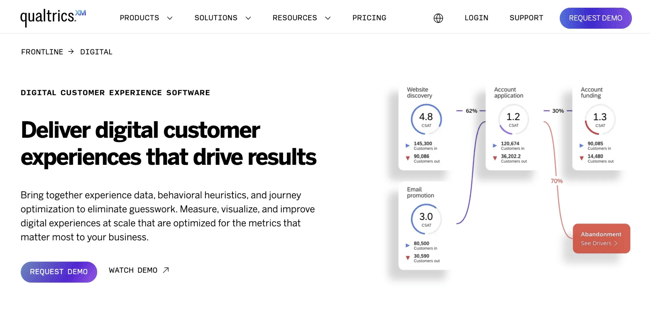
Qualtrics takes away the hassle of finding respondents for your market research surveys. They provide an online sample service so you can access real, live human thoughts without having to actually manage any humans.
It’s an introverted marketer’s dream come true!
Once you’ve identified your target audience, head on over to Qualtrics and sign up to access a representative sample.
You can then use Qualtrics’ built-in platform to start gathering insights and information from the people whose pain points you might be able to help solve.
Pro tip: You can actually choose between Qualtrics’ built-in platform or using your own chosen survey software. Sometimes, you’re already familiar and comfy with one system or need to hustle with a program you know — Qualtrics lets you pick.
Pricing: Pricing is available on request.
25. ProProfs Qualaroo
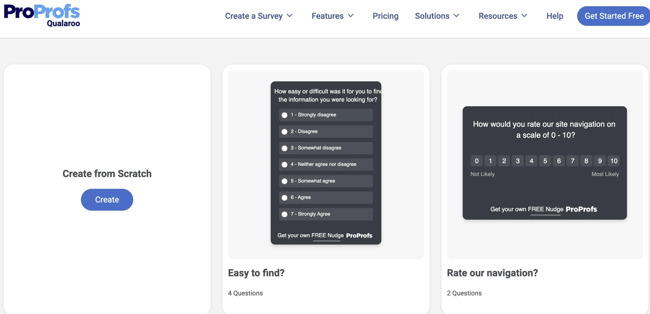
Qualaroo is an advanced user and market research tool that helps you understand your specific market with targeted surveys.
You can run surveys on over six channels at once — such as website, app, product, social media, and email — to get a 360-degree view of your existing and potential customers.
It comes packed with features like question branching, 12+ answer types, automatic survey language translation, in-depth audience targeting, pre-built survey templates, and an extensive repository of professionally designed questions.
You can create various market research surveys in minutes to collect data on the demographic, psychographic, and behavioral traits of your target audience.
It can help you map customers’ expectations and preferences, create customer personas, and perform audience segmentation.
Qualaroo also promotes quick feedback analysis. Its in-built AI-based sentiment analysis and text analytics engine automatically categorizes the responses based on user moods.
It also highlights the key phrases and words in real time, saving hours of manual work.
What we like: In my experience, you can get an awful lot done with just this one source for conducting market research. I like it for its rare combination of tool inclusivity and affordable pricing — it’s definitely a solid source to start with.
Pricing: Omni channel plans for up to 50 responses are free. Omni channel plans for businesses up to 100 responses cost $19.99 per month, billed annually. Email surveys up to 50 responses are free.
Email surveys for businesses up to 100 responses cost $9.99 per month, billed annually.
Conduct Market Research for a Successful Product Launch
Conducting market research is essential to a successful product launch to market.
With the tools I’ve just introduced you to, you can find out who’s looking for your product, why they need it, and how you can better market whatever you’re looking to launch.
Editor's note: This post was originally published in April 2016 and has been updated for comprehensiveness.
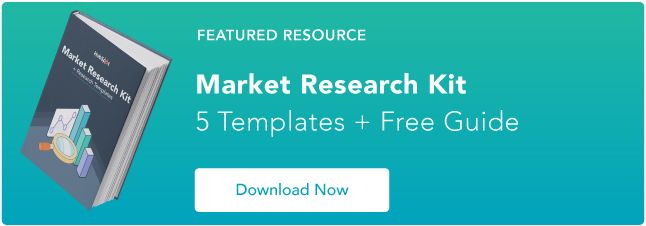
Comments
Post a Comment